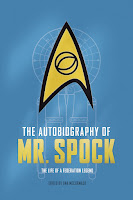The Autobiography of Spock is another extraordinary thing, perfectly weaving together the different threads and revelations from a great multiplicity of texts on screen: stuff revealed about Spock's background in the original Star Trek TV series, all the stuff about his dad in Star Trek: The Next Generation, the never-previously mentioned brother in the movie Star Trek V, the never-previously mentioned sister in Star Trek: Discovery, the stuff in the 2009 reboot movie and bits gleaned from Star Trek: Picard. In the acknowledgements, Una mentions a number of Star Trek books and novels she's borrowed from, too, and the essays on Romulans by Michael Chabon and on James T Kirk by Erin Horakova. I'm sure there's more, and part of me would love to see a version of this autobiography with footnotes that cite all the sources.
But that would perhaps break the spell. Given so much material to choose from, some of it contradictory or at least inconsistent, it's remarkable how cohesive this book is. That's partly due to the structure, each chapter focused on someone that Spock loved, enabling Una to focus on particular, telling moments in the long life in which Spock prospered. Given such a famously logical, aloof character, a focus on his love life is initially surprising but it really works, in part because this is love in the broadest sense - the subjects include Spock's parents, his sparring partner Dr McCoy and even the starship Enterprise. But it also works because it's at the heart of what the book is addressing: Spock coming to accept his hybrid nature as half-human, and his emotional side. There's a lot on searching for and accepting the truth - of situations, or events, of ourselves. Spock is honest about failure, about when he's got things wrong. There are passages in this that change my sense of what's happening in the things I've seen on screen.
The point is that it doesn't feel like a jigsaw. There's fun to be had in spotting the sources - when mention is made of the expression on Kirk's face on seeing Spock mind-meld with a whale, I know exactly what that's from and exactly that expression. But this is not simply a list of references to events in episodes and movies. It's a story, Spock's story, full on fresh insight and perspective - and lots of original material. We find out what happened to other characters from these episodes and movies, the aftermath of events seen on screen. I'd love to see more of Saavik and Valeris on screen after what we're told about their later lives here.
Una says in her acknowledgements at the end that, for all the many actors who have portrayed the character,
"There would of course be no Spock without Leonard Nimoy, and I hope his voice sounds true upon these pages."
It really does, and the result is like hearing again from an old friend. In spending time inside the head of this beloved character, I've come to know him better, and to feel his loss all the more.









No comments:
Post a Comment